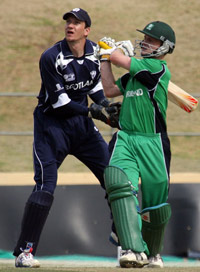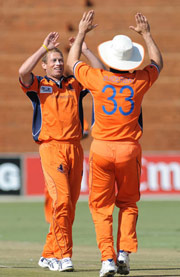
After nearly three weeks of intense competition, and 54 matches with not a single over lost to the weather, it's time to take stock of what the ICC World Cup qualifying tournament in South Africa showed us about the current state of the participants.
We'll start with the top six, the sides which secured ODI status until 2013.
Number One after the Super Eight phase and comfortable winners of the final, Ireland confirmed throughout the competition that they are currently the best of the Associates.
They were ambushed by Afghanistan on a turning wicket in Krugersdorp, and they lost their final Super Eight match against Kenya with an understrength team after they had already qualified for the World Cup and reached Sunday's final, but otherwise they reigned supreme.
Their top six was distinctly the most powerful, William Porterfield, Eoin Morgan, Niall and Kevin O'Brien and Andrew White all making consistent runs, and the fact that these five plus Gary Wilson made fourteen half-centuries between them, and shared in half a dozen century partnerships, speaks for itself.
In Boyd Rankin and Peter Connell they had one of the outstanding new-ball pairings in the tournament, and the fact that they were able to achieve what they did largely without the services of André Botha and Kyle McCallan attests to the strength in depth of the Irish squad. And it's noteworthy that in conditions which were generally unhelpful to spinners, Regan West picked up 14 wickets.
Canada, too, had a fine opening attack in Henry Osinde and Umar Bhatti, and together with their fellow-seamers Khurram Chauhan and Rizwan Cheema they accounted for 45 wickets between them.
That was one of the keys to the Canadians' success as they lost only to Ireland in the group phase and then went on to register comfortable victories over Kenya and Afghanistan in the Super Eights. They lost their last three matches, but they had already done enough to make sure both of their World Cup slot and their place in the final.
Despite the loss of John Davison through injury after the group phase, their batting was mostly solid, Geoff Barnett, the explosive Rizwan Cheema, Ian Bilcliff, Sunil Dhaniram and skipper Ash Bagai all making valuable contributions, although no-one showed the consistency that might have taken them to the next level.
The Netherlands made sure of their World Cup qualification with a win over Canada on the last day of the Super Eight phase, and this and their two victories over Kenya were their best performances of the tournament.
In between, they registered important victories without ever firing on all cylinders, and their defeats at the hands of the UAE in the group stage and Scotland in the Super Eights seemed for a time likely to come back to haunt them.

In Edgar Schiferli they had the Player of the Tournament, and in ten games he never produced a less than outstanding opening spell. The rest of their bowling was less inspiring, although Darron Reekers contributed great performances against Afghanistan and Canada, and Mudassar Bukhari, Ryan ten Doeschate, Peter Borren and Pieter Seelaar all took vital wickets on occasion.
It was the batting that was the strength of the Dutch: Ryan ten Doeschate played two magnificent innings and one very good one, and Alexei Kervezee, with 461 runs at 51.22, confirmed his progress as one of the outstanding young batsmen in Associates cricket. Bas Zuiderent, Player of the Tournament four years ago, hit four half-centuries and was solid in the middle order.
In third spot after the Super Eights thanks to their final-round win against Ireland, Kenya's form was patchy, although at their best they remain a powerful outfit. But their batting crumbled in the third/fourth play-off match and they had to settle for fourth spot.
Steve Tikolo had a disappointing tournament and Thomas Odoyo a modest one, and with the exception of Kennedy Otieno and Collins Obuya the batting generally failed to find the consistency that was needed to challenge the leading sides.
The most successful of their battery of seamers was Lameck Onyango, but spinners Hiren Varaiya and Jimmy Kamande suffered from the unhelpfulness of almost all the pitches for bowlers of their type. Of the younger generation, Seren Waters and Alex Obanda played important innings, while seamer Elijah Otieno made the most of his limited opportunities and may well be a name to watch for in future.
The two sides which missed out on World Cup qualification but secured ODI status for four years reveal two radically contrasting images of non-Test cricket.
The meteoric rise of Afghanistan from the lower reaches of the World Cricket League to the very brink of the World Cup itself is a story that has been told repeatedly in recent months, but the capacity of the squad to go on surpassing itself is truly astonishing.
After a group phase in which they lost to Kenya, The Netherlands and the UAE, beating only Denmark and Bermuda to squeeze into the Super Eights, they proceeded to win three out of four Super Eight matches in securing ODI status, including a remarkable victory over eventual champions Ireland.
The key was a steady improvement in the batting: from totals around 200 early on, they raised their sights as the tournament progressed, and by the end they were able to reach the scores well in excess of 250 which were needed on these South African pitches. And they did it with only one century, by opener Noor Ali Noori: the key was the consistency of middle-order batsmen like skipper Nowroz Mangal, keeper Mohammad Shehzad, and allrounder Mohammad Nabi.

Nabi, of course, was, along with seamer Hamid Hassan, one of the established stars of the side, but the continuing development of Asghar Stanikzai and Samiullah Shenwari, and the conversion of Karim Khan from wicketkeeper into spin bowler, are tributes to the side's commitment and the skill of coach Kabir Khan.
Title-holders Scotland, on the other hand, were the greatest disappointments of the tournament, and they were in the end fortunate to have held on to their ODI status for another four years.
They owed a great deal to Neil McCallum, who kept them in the hunt with three centuries in the first four matches, but even he faded later in the tournament and added only another 114 runs in six more innings. Openers Kyle Coetzer and Gavin Hamilton showed consistent good form, making 424 and 353 runs respectively, but the rest of the batting failed miserably, with skipper Ryan Watson, with 72 runs in ten innings, experiencing a nightmare tournament.
With old hands like Watson, Craig Wright and Colin Smith thoroughly out of form with the bat, it needed the younger brigade to fire, but they were largely unable to do so. Wright did well with the ball, taking 16 wickets at an admirable average of 13.62, and John Blain added much-needed bite to the attack when he returned from injury, with 17 at 20.18; each of them, however, played in only seven matches.
It was Hamilton's century and McCallum's half-century, coupled with Wright's four wickets, in the final Super Eight match against the UAE which in the end saved the Scots' blushes and kept them in the top six, but there will need to be some serious soul-searching in Edinburgh if Scotland's decline is to be arrested.